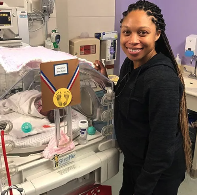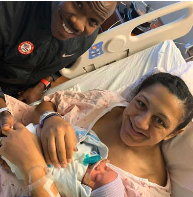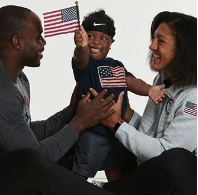As the 2022 Winter Olympic Games are set to begin February 4th in Beijing, here are 4 stories of NICU Miracles with Olympic-size strength:
ALLYSON FELIX
Allyson Felix is an Olympic athlete who has a total of 10 Olympic medals—six gold, three silver, one bronze—the most any woman has ever won in track and field.
Her daughter Camryn, born Nov 28, 2019 at only 32 weeks when the athlete had to have an emergency C-section because of severe pre-eclampsia.
“[The NICU] was my entire world,” she wrote on social media shortly after her daughter’s birth. “Staying in the NICU all day & night watching my baby girl fight. I can still hear the beeping and alarms of the machines. The uncertainty. The fear.”
Felix’s traumatic labor and delivery in 2018 led her to become involved in Better Starts For All, a maternal health program launched by the March of Dimes. The program offers on-the-ground clinical care and virtual interventions to bring maternal health care to underserved communities.
To learn more about the mission of Better Starts For All, visit betterstartsforall.com.
ELANA MEYERS TAYLOR
Elana Meyers Taylor is a three-time Olympic medalist and two-time women's bobsled world champion who welcomed her son Nico in 2020.
Meyers Taylor, who took the entire 2019-20 season off, was in labor for two days and induced three weeks early, before undergoing an emergency C-section.
On February 22, 2020, the day her son Nico was born, doctors told the Taylors they suspected he had Down Syndrome. Two days later, the news was confirmed and Nico spent 8 days in the NICU. Nico also had profound bilateral sensorineural hearing loss and wears hearing aids.
“From the moment we laid eyes on him, of course we fell in love with him,” she said. “It didn’t even matter what diagnosis he had.”
WAYDE VAN NIEKERK

Wayde van Niekerk is now a world record-holder, global sprint sensation and home-grown hero. But before all of that, he was a tiny baby fighting for his life in the NICU.
van Niekerk was born on 15 July 1992, in Cape Town, South Africa. He was born at just 29 weeks gestation at just over 2lbs, had jaundice, needed a blood transfusion and was fighting an infection.
His mother Odessa Swartz recalls, “The first 24 hours after he was born were touch-and-go. There was no warning that he might come early. Everything just went the wrong way. I was young; I was terrified. I thought I’d have more time to prepare for this.”
Doctors told Odessa they were sure he would die within a day or two of being born, and that if he survived, he would most likely be disabled. “They warned me he might be blind, or deaf – but they also said there was a chance there would be nothing wrong.”
And that ‘one chance’ gave her hope and the drive to keep going – one day at a time.
“Each and every day I had my child with me was a gift,” says Odessa. “It’s a privilege for me now, after everything we have been through, that I can say: This is my son, this is someone I look up to and admire. This is my hero.”
WILMA RUDOLPH

At the 1960 Rome Olympics, Wilma Rudolph was quickly dubbed “the fastest woman in the world,” and became the first American woman to win three golds in one Olympics.
But before she was an Olympic star, Wilma was a preemie, born June 23, 1940 at just 4 lbs 8oz. At the time, there wasn’t much help for premature babies as the medical world knew very little. Because she didn’t get the solid start that preemies nowadays get, she spent many of her younger years in bed, battling Polio & Scarlet Fever that caused her to lose use of her left leg.
More than anything, it was her mom’s positive thinking that fueled her. Her mother would drive 90 miles in the segregated south to find a doctor that would treat her. Even then, she recounts in her autobiography, “My doctor told me I would never walk again. My mother told me I would. I believed my mother.”




